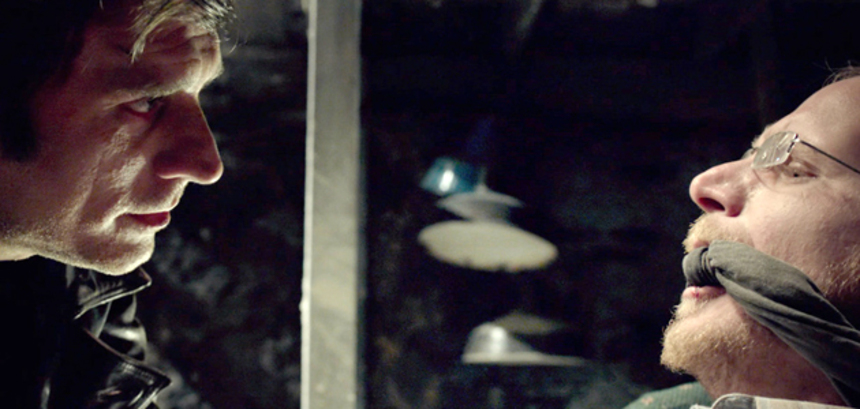Tribeca 2013 Review: Who's Afraid Of The BIG BAD WOLVES?

Editor's Note: some would consider this review a spoiler, as it discusses the ending, although doesn't reveal what happens.
That would be Navot Papushado and Aharon Keshale, helmers of previous TFF favorite, Rabies. Rabies caused quite a bit of buzz at the 2011 festival and enjoyed a fair amount of critical success thereafter. With their second film, the Israeli duo switches gears from slasher flick to psychological thriller, with a liberal dash of black humor thrown in for good measure.
Big Bad Wolves is about a loose canon cop (You're out of control! Turn in your gun and your badge!) and the father of a murdered child who decide to take the law into their own hands. Separately. And then as a team. After the alleged murderer/rapist walks due to police misconduct, the two vigilantes kidnap the suspect with the intention of forcing a confession (and the whereabouts of the victims' pretty little heads) out of him. What follows is some gruesome torture and a number of reversals which leave the audience wondering who the hell the good guys are.
The film opens with a great, slo-mo credits sequence featuring a group of children playing hide-and-seek set to to a bombastic score. Right away you know you're in the hands of talented filmmakers. It's shiny and slick in all the right ways. When the credits end, that's when things start to get down and dirty. The suspect is being interrogated illegally. The chief of police calls, demanding his release. Shortly after that, the headless body of a little girl is found in the woods, propped up in a chair, panties around her ankles.
There is a good deal of humor to help balance out the harsher realities of the subject matter, but it isn't until the cop, the victim's father, and the suspect are holed up in a dingy basement that I realized just how funny Big Bad Wolves was. A lot of the humor stems from the Jewish family dynamic, especially when juxtaposed with the film's outrageous violence. When the father of the victim lies to his yenta mom about being sick, she promptly sends his own father over with some homemade soup. Seeing the father and son take a blowtorch to a man only to be interrupted by phone calls from Yenta Mom helps alleviate the mounting tension. Seeing an old man who has perpetrated such an atrocity lie to his wife on the phone about smoking is pure comedy.
The audience questions the suspect's guilt throughout, and soon the cop does as well. His skepticism earns him a place tied up next to the accused. It makes for a great commentary on the morality of government torture as a means of procuring information, especially in our post Abu Ghraib world. It continues the conversation started with Zero Dark Thirty, although here we don't have to worry about pesky factual inaccuracies concerning real life events. And even though this film is more of an entertainment, it is no less effective in its depictions of the gray areas of our pursuit of justice.
Big Bad Wolves is a film that exists in those gray areas. The areas between right and wrong, good and bad, entertainment and unease. That final shot that caused a ripple of discomfort during the screening? That's not a directorial misstep, that's a barometer of the audience's humanity. It is the mark of a film that has something important to say, despite its genre trappings. Based on the strength of their writing and their talent behind the camera, I wouldn't be surprised to see Navot Papushado and Aharon Keshale courted by Hollywood after this. At the very least, Big Bad Wolves has "American Remake" written all over it. One can only hope that if they emigrate from Israel, the pair aren't swallowed by the even bigger, badder wolves of the studio system.
Joshua Chaplinsky is the Managing Editor for LitReactor.com. He has also written for ChuckPalahniuk.net. He might still be a guitarist in the band SpeedSpeedSpeed, and is the poison pen behind thejamminjabber, although he's not so sure he should admit it.

Do you feel this content is inappropriate or infringes upon your rights? Click here to report it, or see our DMCA policy.





 (1)-thumb-80x80-93563.jpg)
